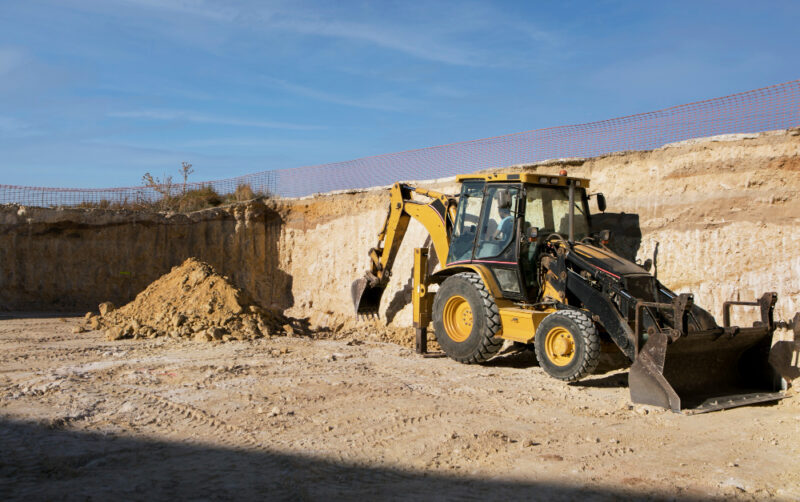
Sand Mining Activities in Africa
The United Nations Environment Programme (UNEP) defines sand mining as “the removal of sand from the environment to meet an increasing demand for sand for construction purposes, mainly for the production of concrete and asphalt”[1].
Sand mining has become a widespread and lucrative business in Africa. The continent is home to some of the world’s largest sand reserves, which have been used for construction, and land reclamation. It is also commonly used in construction, especially in urban areas where there is a high demand for housing and infrastructure. The construction industry is booming across the continent, fuelled by rapid urbanization and population growth. This has led to a massive increase in sand mining activities, which have become a significant source of income for many people. However, the uncontrolled and often illegal extraction of sand has led to severe environmental and social impacts, including the destruction of ecosystems, loss of livelihoods, and displacement of communities.
Illegal sand mining is a significant problem in Africa, particularly in countries such as Kenya, Uganda, Tanzania, and Sierra Leone. In many of these countries, the lack of effective regulation and enforcement has allowed for rampant illegal sand mining to occur[2].
The Dangers of Sand Mining in Nigeria
Sand mining has severe environmental consequences. It can cause erosion and sedimentation, which can alter the flow of rivers and affect the habitats of aquatic organisms. Sand mining can also reduce water quality and quantity, which can affect agriculture, fishing, and other industries that rely on water resources[3]. Furthermore, sand mining can cause the loss of biodiversity, as it can destroy habitats and disrupt ecosystems.
In Nigeria, sand mining has had severe consequences for local communities. One of the most significant impacts is the displacement of communities that depend on natural resources for their livelihoods. Sand mining often involves dredging and excavation, which can damage or destroy crops, fisheries, and other sources of livelihood. Additionally, sand mining can cause environmental pollution, as it often involves the use of heavy machinery, which releases emissions and noise pollution.
Another impact of sand mining in Nigeria is the damage to infrastructure. It can cause erosion and sedimentation, which can affect bridges, roads, and other infrastructure and lead to costly repairs and even accidents, such as bridge collapses.
Moreover, sand mining can contribute to climate change. The process of sand mining releases large amounts of carbon dioxide into the atmosphere, which contributes to global warming. Furthermore, the loss of vegetation due to sand mining can reduce the capacity of natural ecosystems to absorb carbon dioxide from the atmosphere.
Instances of the direct impact of the activities of sand mining in Nigeria
- Lekki Beach Erosion: Sand mining at Lekki Beach in Lagos has been blamed for the erosion that has affected the beachfront, causing damage to buildings and infrastructure. In 2017, the Lagos State Government banned sand mining in the area, but it has been difficult to enforce the ban, and illegal mining still continues[4].
- Environmental degradation in Cross River State: Sand mining has caused extensive environmental degradation in Cross River State[5]. The activity has destroyed farmlands, aquatic habitats, and forests. The government has set up a task force to enforce the ban on sand mining, but it has been difficult to curb the illegal activity.
- Flooding in Anambra State: Sand mining in Anambra State has led to flooding in the state, which has caused the displacement of people and damage to property. In 2020, the government ordered the closure of all illegal sand mining sites in the state, but the problem persists.
- The activity has damaged fishing grounds, making it difficult for fishermen to make a living[6]. The government has set up a committee to investigate the issue, but no concrete action has been taken.
- Destruction of a royal palace in Osun State: Sand mining caused the destruction of the Olojo of Ojo’s palace in Ojo, Osun State. The activity caused the collapse of the palace walls, and the government has since banned sand mining in the area.
Recommendations
- To address the dangers of sand mining in Nigeria, several solutions can be implemented. One approach is to promote sustainable sand mining practices that minimize the environmental impact of sand mining. This can be achieved through the use of environmentally friendly technologies and practices, such as the use of dredging machines that minimize sedimentation and the restoration of mined areas to their original state.
- Another solution is to strengthen the regulatory framework for sand mining in Nigeria. The government can enforce existing laws and regulations to ensure that sand mining activities are carried out in a sustainable and responsible manner. Additionally, the government can develop new policies and regulations that promote sustainable sand mining practices and protect the rights of local communities.
- Community engagement is also essential in addressing the dangers of sand mining in Nigeria. Local communities can be involved in the decision-making process regarding sand mining activities in their areas. This can help to ensure that their rights and interests are protected and that sand mining activities are carried out in a sustainable and responsible manner. Furthermore, community engagement can help to raise awareness about the environmental and social consequences of sand mining and promote the adoption of sustainable practices.
